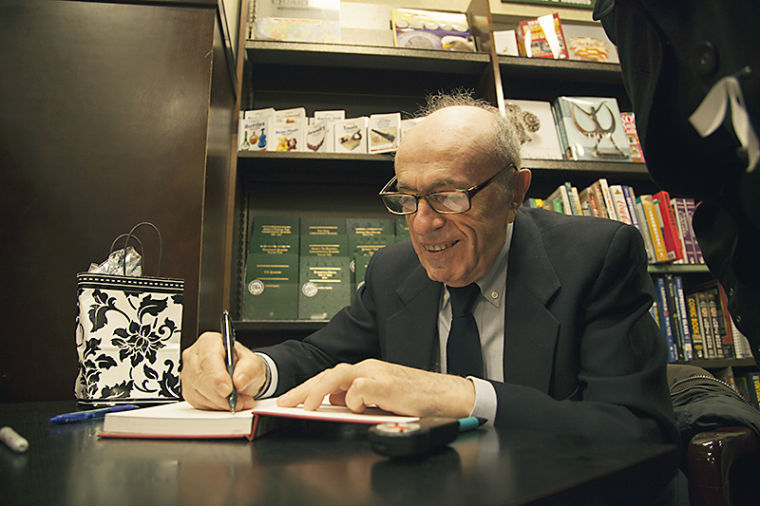Holocaust survivor speaks on the evils of prejudice
October 18, 2013
Gathered in a back corner of Barnes and Noble late Tuesday night, WKU students and members of the Bowling Green community alike sat, stood and crouched to hear Samuel Marder, an 83 year old Holocaust survivor, speak of his experiences, speak against prejudice and speak of his new book, “Devils Among Angels: A Journey From Paradise And Hell To Life.”
“Mark Twain once said, that it is by the goodness of God that in our country we have those three unspeakably precious things: freedom of speech, freedom of conscience and the prudence to never practice either of them,” Marder said. “It is for this reason that I actually decided to talk to people.”
Marder’s book chronicles short stories, poems and more of his life before, during and after the Holocaust.
“I don’t have much time to talk about my experiences, we would have to be here a few years to listen to it,” Marder said. “But I will give you a little picture.”
Marder described his childhood as a happy one, a sheltered one, although his first experience with prejudice came at an early age. Upon walking to school, he was called derogatory names, chased and hit with stones by a group of boys.
“Little boys from another school, and belonged to a church somewhere, got some education I wish they would not have gotten,” Marder said. “They called me ‘Jesus killer,’ and ran at me, but one good thing came out of that: I became a very good runner.”
Being taken from his home at age 10, Marder was made to live the next three and a half years in a concentration camp in Transinistria, located in present day Moldova. Food was not given to prisoners of this camp.
“They did not have to shoot us, because people died right and left,” he said.
After liberation, he would be one of 12 men to survive in the room in which he boarded, surviving his own father. He and his surviving family, consisting of his mother and sister, made their way slowly to the United States. From there on he would begin pursuing a career as a concert violinist, an instrument he had practiced before the war.
Marder made the conscious decision, despite his experiences, to not hate his enemies, or any people.
“I was taught not to hate,” he said. “After the war, we walked into the streets and there were thousands of German soldiers lying on the floor and I can tell you that I had absolutely… I felt absolutely no bad feelings towards them.”
Marder continued to warn that prejudice is still a part of the world, and it is not to be taken lightly.
“I get very upset when I see prejudice, terribly upset,” he said.
Marder said the danger of prejudice has become so great that it threatens the world as a whole, no longer presenting itself exclusively to a certain area.
“I wish there would be more people that would devote their time to talk about these things, because prejudice is almost an acceptable disease,” he said.
He encouraged that people must keep trying to prevent prejudice and hatred from spreading.
“We live in a world that keeps repeating history, part of the reason is that people don’t speak; when there is evil going on in the world, there is no one to speak,” Marder said. “No matter what culture we live in, what background we come from, we are interrelated.”
During a question and answer session, Marder was given an array of controversial questions, sparking debate between him and an audience member inquiring insight on recent Palestinian violence.
More than 50 people attended the event, drawing in a crowd large enough that many were standing on step stools and peering over the tops of bookshelves to get a better view.
“Sam Marder’s mission is to teach tolerance and open mindedness to students like us, to widen the birth of acceptance in our schools, our communities and our lives,” John Cipolla, associate professor of music, said, reading from an introduction speech written by his daughter, Gabriella.
This was the second presentation in the Far Away Places lecture series hosted by WKU Libraries this year. The series brings in speakers who have done research or have experienced significant events in foreign countries.
“My message really is that only goodness and kindness can change it, can change the whole situation all over the world,” Marder said. “Goodness and kindness is the only solution in the world.”












![Students cheer for Senator at Large Jaden Marshall after being announced as the Intercultural Student Engagement Center Senator for the 24th Senate on Wednesday, April 17 in the Senate Chamber in DSU. Ive done everything in my power, Ive said it 100 times, to be for the students, Marshall said. So, not only to win, but to hear that reaction for me by the other students is just something that shows people actually care about me [and] really support me.](https://wkuherald.com/wp-content/uploads/2024/04/jadenmarshall-1200x844.jpg)




![Students cheer for Senator at Large Jaden Marshall after being announced as the Intercultural Student Engagement Center Senator for the 24th Senate on Wednesday, April 17 in the Senate Chamber in DSU. Ive done everything in my power, Ive said it 100 times, to be for the students, Marshall said. So, not only to win, but to hear that reaction for me by the other students is just something that shows people actually care about me [and] really support me.](https://wkuherald.com/wp-content/uploads/2024/04/jadenmarshall-600x422.jpg)








